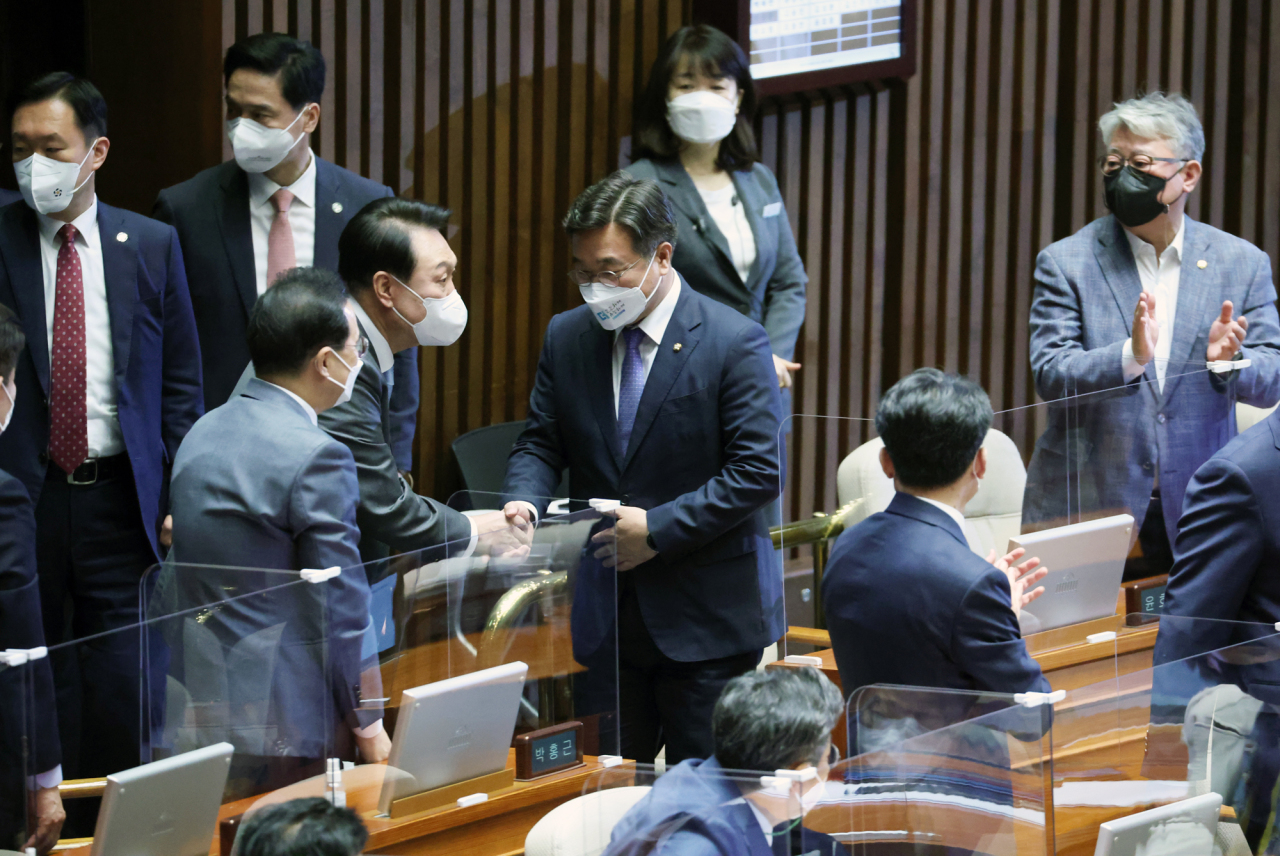President Yoon Suk-yeol emphasized Monday the need for bipartisan cooperation on passing a supplementary budget to compensate for pandemic losses and to expand economic and security ties with major countries.
In his first speech as the president at the National Assembly, Yoon focused on “bipartisan cooperation” and expressed his strong willingness to resolve pending issues with the support of lawmakers.
After the speech, Yoon walked around the plenary session, shaking hands with opposition Democratic Party and Justice Party members. He wore a sky blue tie, close to the cobalt blue used by the Democratic Party, instead of his party color, red.
Introducing the 59.4 trillion won ($46.2 billion) supplementary budget plan in his speech, Yoon requested lawmakers to pass the bill as early as possible to stabilize peoples’ livelihoods, which he said was “more urgent than ever.”
He voted on the budget earlier on Thursday at his first Cabinet meeting. It includes 36.4 trillion won to pay at least 6 million won each to 3.7 million small business owners and self-employed people who suffered from business restrictions due to the pandemic.
“The bill is meaningful as a first step in resolving the challenge ahead of us according to the principle of parliamentarianism,” the new president said.
“What the government took into consideration in composing the supplementary budget was to fully compensate for the losses of small business owners while maintaining macroeconomic stability such as interest rates and inflation,” he said.
Yoon also requested the support of the National Assembly for the government to expand economic and security cooperation with major countries and lead the formulation of international norms.
“We will discuss ways to strengthen cooperation in the global supply chain through the Indo-Pacific Economic Framework with US President Joe Biden visiting Korea this week,” he said.
The IPEF, a Biden administration initiative, refers to economic cooperation among Indo-Pacific countries to safeguard against China’s economic influence. Since the Moon Jae-in administration, South Korea has been positively reviewing the participation in the IPEF, stating that it “welcomes” the initiative.
Yoon mentioned that the agenda would include supply chain stabilization and various economic security issues, such as the digital economy and carbon neutrality.
In Yoon’s meeting with reporters after the speech, Yoon said that there is no separation between ruling and opposition parties regarding the relationship between the government and the parliament.
“It was a pleasant and honorable event for me personally, and I hope that this opportunity today will serve as one page in developing our democracy and parliamentarianism,” he told the press.
Such a move by Yoon is essential to run the country with the National Assembly, which is dominated by opposition Democratic Party members.
The Yoon administration faced challenges in appointing ministerial candidates, including a prime minister, due to opposition from the Democratic Party. He sought to hold a dinner meeting with ruling and opposition party leaders on Monday evening to have a frank conversation, but the meeting was canceled due to the Democratic Party’s non-response.
Although the speech ended in a rather friendly atmosphere, it still seemed challenging to draw cooperation from the opposition party.
Democratic Party spokesperson Koh Yong-jin said at a press conference after Yoon’s speech that his party would actively cooperate with the expeditious handling of the supplementary budget bill requested by Yoon.
However, regarding Yoon’s emphasis on cooperation with the opposition party, Koh said, “If (Yoon) truly seeks cooperation, he must first express regret for selecting inappropriate people for the cabinet and the secretariat.”
The Democratic Party called Yoon’s minister candidates and secretaries nominees “below the standard” and alleged that they had “poor conscience,” demanding the cancelation of the appointment for “national unity” and “cooperation” between the ruling and opposition parties.
By Shin Ji-hye (
shinjh@heraldcorp.com)





![[Herald Interview] 'Trump will use tariffs as first line of defense for American manufacturing'](http://res.heraldm.com/phpwas/restmb_idxmake.php?idx=644&simg=/content/image/2024/11/26/20241126050017_0.jpg)


